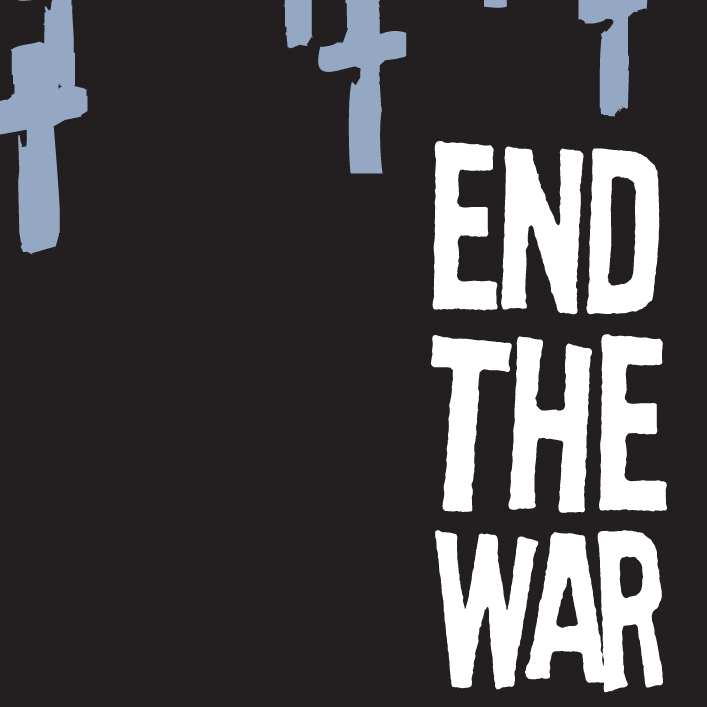 “George Bush was kind of good for the anti-war movement.” — Jacob Aaron Crawford, US Naval Farsi interpreter
“George Bush was kind of good for the anti-war movement.” — Jacob Aaron Crawford, US Naval Farsi interpreter
Less than two months ago, The March on the Pentagon protest drew hundreds of peace activists who walked from the White House to the Pentagon carrying banners that read “End the war now,” “Bring all our troops home,” and “You Can’t Win An Occupation.” They unified to grieve the 6th anniversary of aggression by the United States against Iraq.
Demonstrators carried 170 coffins covered in the flags of countries where American policy had killed civilians.
Some standards stood out from the visual din due to their prevalence.
Flags like Iraq’s, where more than 1.3 million people have been killed by violence since the U.S. led invasion in 2003, according to Just Foreign Policy. Iraqis continue to live in fear of deadly, indiscriminate attacks. If random acts of violence, death, and dismemberment weren’t on their minds, until this year, American forces operated under the purest conditions of war: they could interrogate and incarcerate Iraqis under suspicion of being “security threats.” U.S. prosecutors needed to meet only one of two criterion for a conviction: witnesses or a confession. Since this security accord has been enacted, nearly 85,000 Iraqis have been held in one of four internment camps and later freed due to a lack of evidence, according to the latest issue of The Economist.
Other flags, like Afghanistan’s, were also hard to miss.
George W. Bush and other U.S. officials promised years ago to disclose evidence that the Taliban regime had conspired with al-Qaeda to commit the 9/11 attacks, and that promise was ultimately forgotten. Which is to say, if they had evidence of such complicity, the administration would never have wasted time initially demanding that the Taliban turn bin Laden over. They would have simply declared war against Afghanistan for having attacked the United States. In response, the Taliban offered to deliver bin Laden to an independent tribunal even though international law did not require it. The Bush administration rejected this offer.
Many national flags were not represented but, like Pakistan’s, have potential.
Since then, April turned out to be the bloodiest month of the year in Iraq, an entirely new theater of war has opened in Pakistan (where the Taliban now stand only 60 miles from Islamabad), and in Afghanistan, the Air Force, Navy and other coalition warplanes dropped a record number of bombs during April (excluding the airstrikes in Afghanistan last week which killed 125 and have drawn international criticism due to the appearance of burn residues…from white phosphorous).
At this rate of bad news, one would expect the anti-war movement to be at full strength.
Quite the opposite.
The most bewildering aspect of this year’s march was not the diversity of flags but the much declined number of participants.
“Numbers are down,” Randall Cotton, the current secretary for AWARE (Anti-War Anti-Racism Effort) reported during a recent meeting. “Financially, it’s a bit worse.”
Carl Estabrook, sporting a pin emblazoned with “Not Another Day, Not Another Dollar, Not Another Death” adds, “What we’re experiencing is not limited to our locale. This is happening everywhere.”
Most blame the economy. After all, it is hard to consider guns when butter is low.
And while there may be some weight to this theory, another offered by Mr. Cotton comes from the unlikeliest of sectors:
“Soon people will wake up and realize they’ve been chumped.”
Jacob Aaron Crawford, a US Naval Farsi interpreter who served his country for 7 years, agrees. He is a member of the local chapter of IVAW (Iraq Veterans Against the War) and is about to graduate from the University of Illinois with a history degree. He also protested in front of the White House that cold day in March.
“It’s very sad. People are hooked on the establishment, the Democratic-Republican binary. I see it as a monopoly. United For Peace and Justice, which was instrumental in past marches, basically said: ‘We’re not going to protest because we’re afraid to criticize the current administration.’ In many ways, they let us all down. It’s our job to increase consciousness … it’s sad, really, how little the American people seem to know or care. To not speak up and tell the truth about the injustice of what’s going on in Iraq, Afghanistan, and now Pakistan, is deeply, deeply disappointing. It’s not that nothing’s shocking … it’s that everything’s shocking, which is far worse.”
We seem to have lost our capacity for outrage.
A visit to the United For Peace and Justice website sums it up: “We recommit ourselves to ending the excessive spending on war and call on the Obama administration to reduce the military budget by 25%”.
Nice.
Despite these obstacles, the peace movement perseveres…as it always shall.
A few recent examples:
Opposition to a ‘game’ recruitment practice.
By arguing that the war in Iraq was illegal, Sgt. Mathis won.








